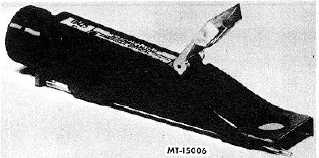|
| |
TRUCK SERVICE MANUAL
TM 5-4210-230-14&P-1
COOLING SYSTEM
Fig. 10 SE-2395 Antifreeze and Battery Tester
TROUBLE SHOOTING
A. CAUSES OF COOLANT LOSS:
1.
Leaks and seepage-may be either external or internal.
External leaks easy to locate, may occur at radiator,
heater, water pump, core plug hole, hose connections, radiator
cap, drain cocks and gaskets.
Internal leaks are more difficult to locate since these
leaks occur at cracks and faulty head gaskets. Internal leaks
are indicated by a decrease in coolant level and the presence of
coolant in crankcase. Correct this condition immediately or
serious damage to engine will result.
2.
Boiling-may be caused by any of the following:
a.
Radiator or other parts of cooling system
clogged with rust or scale.
b.
Grille or. bug screen clogged.
c.
Radiator core fins damaged.
d.
Thermostat defective-stuck closed.
e.
Water pump leaking air into system. f. Radiator
hose collapsed or rotting inwardly.
g.
Radiator pressure cap defective.
h.
Cylinder head loose causing exhaust gas
leakage into cooling system.
i.
Water pump impeller corroded or loose on
shaft.
j.
Antifreeze protection inadequate causing partial
freeze-up.
3.
After-Boil-Boiling which may occur in a cooling system
after the engine is -shut off even though it did not occur
during operation is known as after-boil. This condition
which usually happens to cooling systems that need
attention, occurs because the coolant is still picking up
heat from the engine and the heat is not being
dispersed by circulation through the radiator. Other
causes of after-boil are over-protection or use of high-
temperature thermostat with alcohol type antifreeze,
improper installation of the thermostat, or a thermostat
that is operating improperly.
4.
Foaming-Foaming of coolant may also cause coolant
loss. This occurs only with a very dirty cooling system
and under severe operating conditions. Usually an air
or exhaust leak in the system contributes to foaming
and this is caused by a faulty gasket, leaky radiator
hose or water pump seal. Foam is an excellent
insulator and can seriously interfere with proper
circulation.
5.
Evaporation-Evaporation
reduces
the
amount
of
coolant in the system. This is a common occurrence
where alcohol base types of antifreeze are used. A
faulty pressure cap may also be the cause of
evaporation.
B. CAUSE OF OVERHEATING
1.
Cooling System
a.
Low coolant supply.
b.
Leaks at any of the following: gaskets, hose
connections, water pump, radiator, heater, core
plugs, drain cock or plugs, cracked head or
block.
c.
Broken or loose fan belt.
d.
Radiator clogged.
e.
Collapsed or clogged hose.
f.
Defective pressure cap.
g.
Worn or corroded impeller on water pump.
h.
Foaming.
i.
Radiator air flow obstructed.
j.
Bent fan blade.
k.
Improper or defective thermostat.
2.
Ignition System
a.
Ignition timing late.
b.
Defective spark advance.
3.
Fuel System
a.
Carburetor set too lean.
b.
Valves timed late or leaking.
c.
Intake manifold leaking.
d.
Leak in vacuum operated accessories.
4.
Miscellaneous
a.
Clogged muffler or tail pipe.
b.
Stiff re-built engine.
c.
Dragging brakes.
d.
Low engine oil level.
e.
Engine overloaded.
Cause of Overcooling:
1.
Missing thermostat.
2.
Defective thermostat stuck open.
3.
Short runs and intermittent driving.
CTS-2019P Page 11
PRINTED IN UNITED STATES OF AMERICA
|

